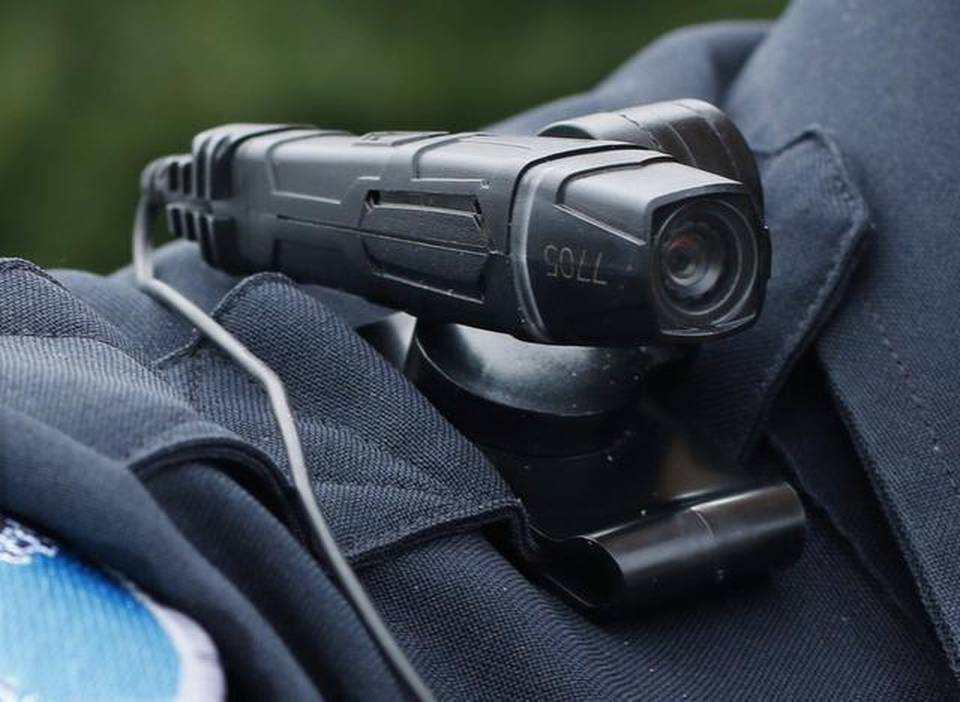Body Cameras for Security Officers. It Is Coming.

February 02, 2014 – George Babnick
Camera technology has advanced to the point that high quality video and audio can now be captured from tiny cameras worn on an officer's sunglasses, collar, cap, or even a regular uniform shirt. As a result, more and more police departments across the United States - both large and small, are starting to equip their officers with body cameras. Some capture just video but some also capture audio.
Thus far this technology is relatively new and there has been very little empirical research conducted on the benefits of such cameras, but the general thinking among police managers is that when people know that they are being filmed, most people will behave more appropriately. And that includes the officers who are wearing the cameras. This hypothesis sounds reasonable.
A recent study on the use of body cameras by the Rialto California police department showed that citizen complaints against officers dropped precipitously by almost 90% and use of force by officers declined by 60%. I predict that future studies on body cameras worn by police officers will have similar findings. Like it or not, good or bad, it is the future of policing in the United States.
Benefits of Body Cameras.
Even though most police agencies in the United States have not yet equipped their officers with body cameras, those that have can point to instances when suspects have pled guilty when faced with video of their actions and cases where plaintiff's alleging police misconduct have dismissed their civil suits when they discovered that there is video evidence that does not support their case. All of this sounds quite good. The police do their jobs while using less force, crooks plead guilty, and those who have no real case drop their civil suits.
When I was a patrol officer I would have been very uneasy with a camera documenting my daily interactions with the many people I contacted each day. I would have been concerned that upper level police brass - far removed from street police work, or some form of a Citizen Review Board would second guess my decisions and every action and use the video to unfairly discipline me. I am sure there are still officers working our streets who share this concern but times have changed. It has been my experience that most of the younger officers who are now patrolling our streets are much more comfortable with this type of technology and like the fact that complaints against them can be quickly disproven with video evidence. I had one young officer express it to me by saying when you do your job right you have nothing to worry about. Video protects me from frivolous complaints and saves the department money. They don't have to spend a lot of time and resources investigating complaints and defending frivolous lawsuits. Well said... well said.
Body Cameras for Private Security Officers?
The widespread use of body cameras for security officers probably won't happen anytime soon, but I foresee the day in the not-to-distant future when private security officers are also equipped with body cameras. When a security officer responds to an incident, the officer can activate the body camera with the simple push of a button. This will provide a real time recording of the event and create an objective record of the events as they unfold.
Saving and Storing Camera Data.
The cost of body cameras is becoming less and less of an issue as good quality body camera can now be purchased for around $500. However, the storage of video captured by cameras is becoming an increasingly big issue. The most important factors when considering data storage are accessibility and reliability. The data must be accessible and the storage method must be reliable. That is, the data must be where it is supposed to be and easy to retrieve when needed. Additionally, information technology security is a vital component to making sure that the video footage is preserved and remains undisturbed for the full period of retention.
Typically, body camera video footage is uploaded by the officer at the end of the shift to an in-house server or an external cloud server. But storing all this video data onsite or in the cloud can be expensive. Most private security companies will likely take a wait and see approach on how law enforcement agencies cope with this before they start equipping their officers with cameras.
Legal Considerations.
Beyond the costs and logistics of storing hours and hours of video in a manner where it can be easily retrieved when needed, recording incidents as they unfold can create legal liability issues. Law enforcement has been able to navigate the legality of using body cameras, but private security companies might be a little more circumspect. The key to understanding the legal implications depends on the type of video footage. Silent video footage versus visual video footage with audio creates different legal responsibilities.
Silent Video Footage.
If the video footage has no sound, there are relatively few federal and state laws governing the collection of footage. It is generally legal to record surveillance video in public places and premises open to the public. If the premise is a completely private premise such as stores, restaurants, and other businesses, the owners of the property could certainly allow security officers to use body cameras. After all, it is just another form of surveillance. While it may not be necessary, it may be best practice for a business to post signs notifying individuals on the premises that body worn recording devices are in use by security. These signs are relatively inexpensive and when prominently placed they have the added benefit of serving as a deterrent to potential criminals and wrongdoers who may be reluctant to proceed knowing their actions will be caught on camera.
Recording video is generally illegal in places where people have a reasonable expectation of privacy. This includes places such as restrooms and changing areas.
Audio and Visual Video Footage.
When video footage includes both picture and audio, there are more laws to ensure compliance with. Federal and state wiretapping laws may impact a security company's ability to record video footage, especially if that footage contains sound. The wiretapping laws were originally designed to deal with telephone communications and generally have not kept up with new technology. But, modernly, these laws also apply to video recording that includes sound. If violated, wiretapping laws could expose the security company to potential criminal prosecution as well as giving rise to civil liability for a claim for money damages against the company.
The federal laws set the minimum standards for recording consent. This means all security companies must comply with the federal laws in addition to any state specific laws. Federal law wiretapping statutes allow recording if one party consents. Practically applied to the security company, this means if the security officer is wearing the body camera and activates it, the security officer consented to the recording. Whatever the other party says or does to object is irrelevant because the security officer (one party under the federal law) consented.
The consent issue becomes more complicated when security companies comply with state specific laws. Many states have their own wiretapping laws. Thirty eight states require only one party consent, but some states require all party consent. In these states everyone must consent to recording.
Does this mean that the security officer must pause before activating a body worn security camera and ask the individual if they consent to recording? In most cases the answer is no! Consent may be implied by the fact that the individual being recorded can see the camera. Another option is having signs that state the premises are under surveillance, including the use of body cameras on security personnel. The mere fact that the individual saw or could have seen the sign and proceeded
About the Author:
George W. Babnick, JD is a 34 year law enforcement veteran with an extensive background in training, school policing, criminal and administrative investigations, supervision and management, and criminal forensics. He recently retired as a Captain in the Portland Oregon Police Bureau where he managed the Forensic Evidence Division. He holds criminal justice degrees from Portland Community College and Portland State University and a law degree from Northwestern California University School of Law, Sacramento California. He is a member of ASIS (American Society of Industrial Security), the Western Society of Criminology, the IAI (International Association of Identification), and the IACP (International Association of Chiefs of Police). He is the author of articles on law enforcement and security, investigations, supervision and management, and risk management related to these subjects.
He can be reached via his blog https://www.physicalsecurityonline.com.
Nothing in any article is intended to or should be construed as legal advice. Persons needing legal advice should seek the counsel of an attorney.






